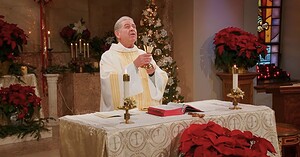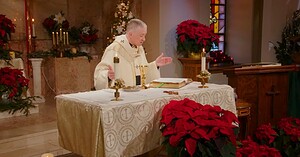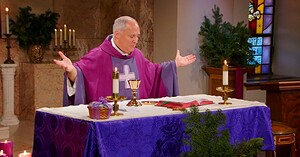The Nativity of the Lord
Homily Video
The Nativity of the Lord Homily Transcript
It’s often been said that God sent his son
Into the world to take on our human flesh,
Not to teach us how to be God,
But how to be human beings.
How to be human beings who live with our mortality,
Our weaknesses, our vulnerability,
And everything that is involved with the
Conditional aspects of our lives,
Where we also begin to see that we cannot save ourselves.
Because the real temptation from the very beginning
Of creation, as we saw in the genesis account,
Is humanity’s temptation to give in to that temptation
That we can save ourselves.
That’s what the eating of the fruit
Of the forbidden tree is about.
That Adam and eve could be Godlike,
Could be those who save themselves.
And so we see here in this account
From the Gospel of Luke how all of that
Really is shown so very powerfully.
For it begins, we see here, by announcing
Those who are in power, who have possessions,
Who have different positions.
Caesar Augustus, the great emperor,
Quirinius, Herod, all of those who in some way
Have control of the situation to the point
Where in fact Mary and Joseph have to move
From their home in Nazareth to come to Bethlehem
To be counted.
Great Caesar looks upon people as his cattle,
As his possessions, as those who are to be accounted.
They also are a family that seems
To have nothing in possession.
But we also see that about the shepherds as well.
Here they’re living, as we’re told,
In the darkness of the night,
Where there is great jeopardy and risk
Of wolves and bandits that can prey upon them
And steal their sheep.
There are also those who are outcasts.
They have to live outside of the city in the field.
They’re really not looked upon with any kind of respect.
And to be honest, they don’t smell too good.
The holy father pointed this out when he told
That pastors that they needed to have the smell
Of the sheep on them.
That came from an experience that he had
When he was a superior of a community
In Argentina as a Jesuit.
As they had farm animals there,
He noticed that one of the newborn lambs
Was being rejected by his mother.
And so he told one of the young seminarians
That he had to care for that sheep,
Take the sheep to his room and feed it
And care for it because otherwise
It wouldn’t survive.
But as that seminarian did that
And then would come into the refectory
Or the chapel, everybody knew he was on his way
Because they could smell him as he walked into the room.
So the shepherds also are those who represent
That human weakness, the frailty,
The incompleteness of life,
The ways in which they live in jeopardy
And also are not counted as important.
So too the holy family.
They’re those who not only are counted
Like sheep or like cattle by the great Caesar,
But they also come to a place
Where there is no room in the inn.
They’re homeless people.
They can only wrap their newborn child in rags
And swaddling clothes.
And we notice later that Herod will pursue them
Because he wants to do away with this newborn king.
So both the shepherds and the holy family
Call us to remember that God has taken on our flesh
To help us understand what it means to be human
And to accept our humanity,
To accept our vulnerability,
Our limitations and yes, our mortality.
Because when we do so,
We open ourselves up to the realization
That God does come to save us.
He not only comes to save us, but he makes us his own.
But when we try to pursue our own salvation
On our own terms of possessions and positions and power,
We find ourselves always fretting about things,
Always anxious and worrying.
It seems that no matter how much money we have
Or power we have, it’s never enough
Because we still wonder if we can save ourselves.
So as we come here on Christmas day,
It is an opportunity to accept the freedom
Of God’s salvation for us,
To put aside the anxiety and the worry
And also the temptation to save ourselves
And to realize that we identify with these shepherds.
We identify with the holy family.
We’re indeed very poor.
We are dependent on God.
But that should in no way discourage us,
But free us, liberate us,
Always to turn to God in our need and our limitations,
In our sickness and moments of want,
And realize that God has come to save us
In a very determined way.
And notice that it is not just good news
For the people who hear this on the first Christmas night.
No, the heavens themselves ring with the praise
Of the glory of God for what takes place.
Yes, Caesar may want to count Mary and joseph
And the people who are poor,
But God tells each one of them and to each one of us
That we count in his eyes.
And so today, as we look at this wonderful scene
Of the Christ child in the manger,
Wrapped in swaddling clothes
And the angels telling the shepherds to go to Bethlehem
To see this great thing,
We too should come to Bethlehem.
We too should be willing to stand at the crib
And look upon this newborn child and see ourselves
And remember that God has come into the world
Taking on our human flesh,
Not to teach us how to be God,
But how to be human beings.
Readings
Featured Text
Discover More
The Holy Family of Jesus, Mary and Joseph
December 28, 2025
The Nativity of the Lord
December 25, 2025
Fourth Sunday of Advent
December 21, 2025
Request Sunday Mass Guide
The Sunday Mass Guide sent to your home address
Spiritual nourishment and updates from the Sunday Mass community
Monthly reflections from Fr. Scott Donahue, our Principal Celebrant


